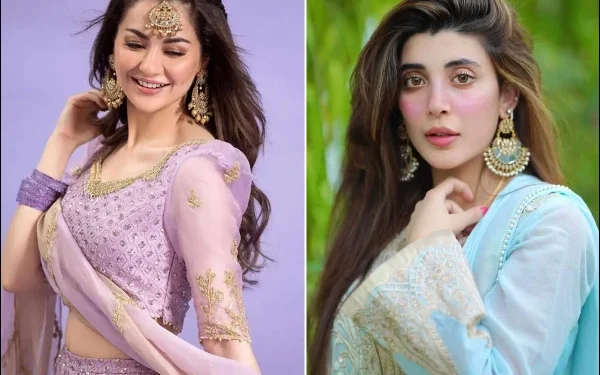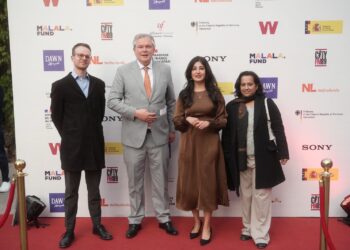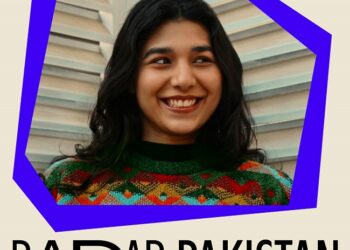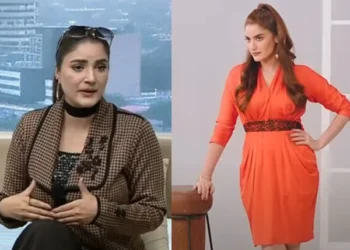In the midst of growing tensions between India and Pakistan, a social media post by popular Pakistani actress Urwa Hussain has stirred significant debate online. Though she did not directly name anyone, the cryptic tone and timing of her message have led many to believe that her criticism was aimed at fellow actress Hania Aamir, who recently responded warmly to Indian fans amid a digital blockade of Pakistani content in India.
Context: Rising India-Pakistan Tensions and Social Media Blockades
The relationship between India and Pakistan has often been characterized by periods of intense hostility interspersed with fleeting moments of diplomacy. In recent weeks, the situation has again taken a turn for the worse, particularly in the digital and information space. The Indian government has reportedly blocked access to several Pakistani social media accounts, including those of public figures such as Prime Minister Shahbaz Sharif, Director General of ISPR, and Information Minister Attaullah Tarar.
These actions are believed to be part of broader information control policies implemented by Indian authorities in response to escalating geopolitical tensions. As a result, many Pakistani artists and public figures have experienced a sharp drop in their engagement on platforms like Instagram and Twitter, particularly from Indian users who now require VPNs to access such content.
Urwa Hussain’s Instagram Story: A Subtle but Powerful Message
Urwa Hussain’s Instagram story has become a focal point in this digital battle of narratives. Without naming anyone, she posted a message emphasizing the importance of self-respect and unity during times of national crisis. Her message read:
“Propaganda is a weapon that is used in wars, and unfortunately we have been suffering from it for decades. When there is a war, you should take care of your self-respect and stand with your people.”
She further added:
“It is more important to take care of your home first.”
These words quickly went viral, with many social media users interpreting the message as a veiled criticism of Hania Aamir’s recent responses to her Indian fans.
Hania Aamir’s Friendly Gesture Towards Indian Fans
The controversy stems from Hania Aamir’s warm replies to Indian fans who used VPNs to access her Instagram posts after Pakistani accounts were blocked in India. One fan commented, “Hello Hania, I got a VPN subscription just for you, love from India,” to which Hania replied, “Love you.” In response to another fan saying, “We will see your posts from Mars too,” Hania charmingly replied, “Sadke.”
While her messages were seen by many as acts of gratitude and appreciation, others viewed them as insensitive or tone-deaf in the context of ongoing diplomatic and digital hostilities. The decline in her post engagement—where once she received millions of likes, she now garners only thousands—has also fueled discussion on how political decisions are affecting artists’ outreach and popularity.
The Fallout: Public Reaction and Social Media Debate
Urwa Hussain’s statement ignited a social media storm, with fans and critics divided into camps. Supporters of Urwa lauded her for taking a principled stance on national dignity and accused some celebrities of prioritizing fame over patriotism. Many tweets and posts celebrated Urwa’s subtle yet powerful message, emphasizing how influential figures should lead by example in times of national difficulty.
On the other hand, Hania’s defenders argued that artists should not be dragged into political disputes and should be free to maintain peaceful cultural connections with fans from any country. They highlighted that artists often play a crucial role in promoting harmony and soft diplomacy between nations.
Celebrity Diplomacy: Balancing Fame and National Allegiances
This debate brings to the forefront the broader topic of how celebrities in South Asia navigate their public personas amid turbulent cross-border politics. With millions of followers from both India and Pakistan, artists like Hania Aamir find themselves in the unique position of being cultural ambassadors, often expected to strike a delicate balance between national loyalty and international outreach.
In contrast, figures like Urwa Hussain represent a more conservative stance, emphasizing unity, patriotism, and restraint during political crises. Both perspectives reflect different approaches to the same issue: how public figures should act during times of national tension.
Impact on the Pakistani Entertainment Industry
The Indian government’s digital clampdown has had a ripple effect across the Pakistani entertainment industry. From decreased reach on social media to limited content distribution, artists are witnessing firsthand how political decisions can curtail their creative and commercial opportunities.
Streaming platforms, film distributions, and music collaborations between India and Pakistan have already been severely impacted in recent years due to political tensions. Now, with social media platforms also being drawn into the conflict, the future for cross-border cultural exchange appears even more uncertain.
Government Reaction to India’s Digital Ban
Pakistan’s Foreign Office and Information Ministry have expressed concerns over the digital blacklisting of Pakistani figures. Federal Information Minister Attaullah Tarar, whose account was also blocked in India, condemned the move as undemocratic and an attempt to curb freedom of expression.
The government has also indicated that it will explore diplomatic and legal avenues to ensure that voices from Pakistan are not unfairly silenced on global platforms. Several Pakistani politicians and media analysts have emphasized the need for a more coordinated digital strategy to counter these bans and to project Pakistan’s narrative effectively.
Public Sentiment: Nationalism, Pop Culture, and Divided Loyalties
Among the Pakistani public, the issue has sparked a complex dialogue on nationalism, freedom of expression, and the role of celebrities. Some believe that showing solidarity with the nation is more important than maintaining global popularity, especially when the country faces international censorship. Others argue that art and culture should transcend politics and that censoring or criticizing celebrities for engaging with fans across borders is counterproductive.
Social media remains the battleground for this debate, with trending hashtags such as #StandWithUrwa and #SupportHania showcasing the polarized opinions.
Conclusion: The Fine Line Between Art and Politics
Urwa Hussain’s comments and the resulting backlash against Hania Aamir highlight the sensitive interplay between celebrity influence and national responsibility in today’s digital age. In a world where borders are often blurred by technology, the actions of public figures are scrutinized more than ever before.
Whether Urwa’s post was a direct criticism or a general patriotic statement, it has undeniably opened the door to an important conversation. As the India-Pakistan conflict continues to manifest in new forms—from political arenas to digital platforms—artists, fans, and governments alike will need to rethink how they engage in this evolving landscape.

























